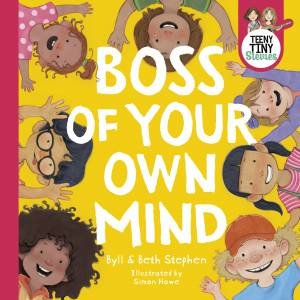Boss of your own mind by Byll & Beth Stephen. Illus. by Simon Howe

Exuberant digital illustrations show a group of children interacting with other children, in their street, at home, at the playground, swimming pool or basketball court. Sometimes they are shown with their families, but mostly with other children. Each interaction shows a situation where a difference of opinion may occur. But the story reiterates, ‘you are not the boos’ of the school or playground or who becomes friendly with whom.
But you are the boss of your own mind, so no one can tell you what to think or how.
Each page presents a different situation which will provoke readers to think about the options offered. Discussions will ensue about behaviour, about what to think about other people and their relationship with you. But the premise still holds that ‘you are the boss of your mind’, a change from the earlier ‘you are not the boss’ of what other people think, feel or do.
The Teeny Tiny Stevens is an ABC series which promotes thoughtful behaviour, which are reiterated in the series of books published in the last two years: How brave I can be, Christmas Days in the sunshine, Boss of your own body, Family all that you dream it to be and Sleep through the night, each promoting a theme for young children to engage with.
The book title reveals the theme of each book, so adults picking the book to read with younger children will know what is at its heart.
Boss of your own mind tells us straightaway that the theme will be about thinking, challenging the readers to be cautious about telling others what to do, but equally, not allowing themselves to the swayed by others.
Each scene shows us a situation which will spark a familiarity with the readers; they have all been to a playground where someone else tries to tell them what to do, or where friends are fluid, and not expected to be exclusively yours.
Lots of positive words are used which reiterate the positive results of being your own boss. Words such as flexible, change, decide, reassured, safe, calm, peace of mind are used through the rhyming lines, prompting readers to incorporate these words into their vocabulary of how to explain how they feel. And these words and their practice will lead to greater well being and peace of mind.
Knowing your own mind means that you can tell others how you feel with kindness and respect.
The book leads children to think more about how they are treated and how they treat others, encouraging respect between all their acquaintances, family and friends.
Themes: Kindness, Respect, Well being, Trust, Family, Friendship.
Fran Knight